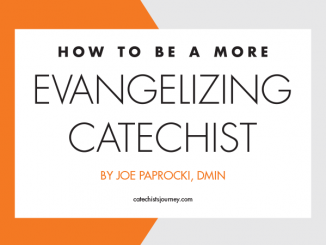
Fear can be a great motivator. When I was growing up, religion classes at St. Casimir School regularly included filmstrips (the great cutting-edge technology of the 1960s) from the St. John’s University Sound Filmstrip Catechism that always seemed to include a depiction of God speaking in an angry voice and/or people burning in hell. For most of us growing up at that time, the primary reason for going to church was to avoid the fires of hell which would consume us if we did not go. People today (especially millennials) insist on being given a good reason why they should wake up on Sunday and go to Mass. Simply going because we are obliged to go does not cut it. That’s not to say that millennials don’t respect the notion of obligation. It simply means that they want to know why something is an obligation. And the response has to be something better than, “because if you don’t, you’ll go to hell.” Many people today simply don’t see going to church as an obligation that is worth the time and effort.
As a Church, we need to go beyond the notion of satisfying obligation and invite people to live heroically. Young people are attracted to involvement in something that they clearly perceive as a movement. Adult faith formation can and should help them to recognize discipleship as entering a heroic movement—God’s movement. We need to “market” the Church, not as a safe oasis where people dream of floating on clouds for all eternity (which, by the way, is a horrible image of heaven!), but as an edgy place where folks grapple with hard truths that compel them to participate in activities that even have a hint of danger.
What, exactly, does it mean to live heroically? In his book, Beyond Success: The 15 Secrets to Effective Leadership and Life, Brian D. Biro explains that one thing that all real heroes have in common is that they use every fiber of their being to do something that makes a profoundly positive difference in the lives of others. Heroic living is a characteristic of Ignatian spirituality. In his books, Heroic Leadership and Heroic Living, Chris Lowney describes the concept of magis (Latin for “more”) as the foundation of heroism. Lowney explains that Jesuits are taught to seek to do “the more”—and not simply as in adding on more activity. Rather, the magis is an attitude that is never content just to go through the motions but is always seeking something greater. Adult faith formation should inspire people to contribute meaningfully to a cause that is greater than themselves. According to Lowney, this type of heroic leadership inspires heroic living, a way of life that is characterized by the desire to live according to a “mighty purpose.” People today are grappling with a world that is increasingly complex. They are seeking a mighty purpose in life to steer them through the chaos. This mighty purpose needs to extend beyond a myopic desire to avoid hell and get to heaven and instead invite people to participate in a movement that seeks to transform the world.
Heroes do not have to wear capes or possess super powers. We all have heroes in our lives—those people who on one or more occasion used every fiber of their being to make a profound difference in our life. The call to follow Christ is nothing less than heroic. Discipleship is about much more than being nice to others. It is about laying down our lives for others, which does not necessarily mean to die physically but to set aside our own needs in favor of tending to the needs of others. Parents and spouses do this each and every day, which is why I consider marriage and parenthood to be two of the most significant conversion experiences in a person’s life. In addition to these two profound vocations, however, anyone who unselfishly and sincerely provides a service to another person, even when receiving remuneration, is heroically laying down his or her life for others: teachers, first-responders, customer service representatives, medical personnel, hairdressers, flight attendants, and so on. No matter what situation they find themselves in, heroes make it a habit of having the best interests of others in mind—just like God. And I can think of no purpose mightier than participating in God’s plan of Salvation.





Be the first to comment